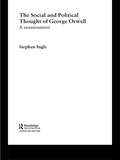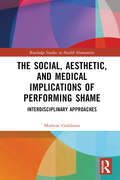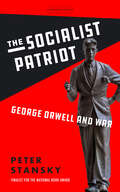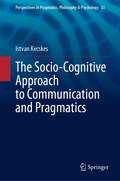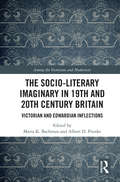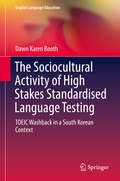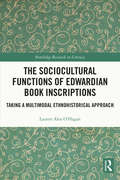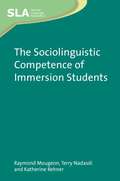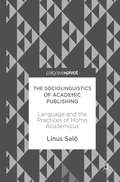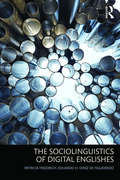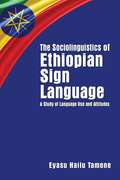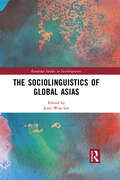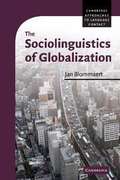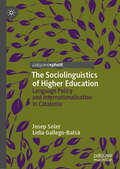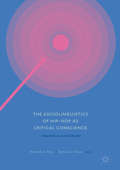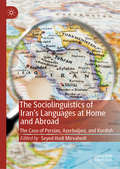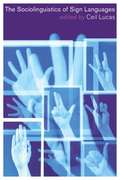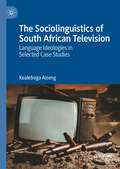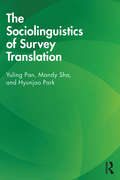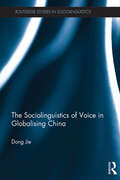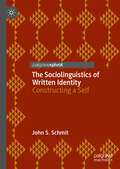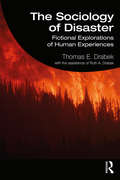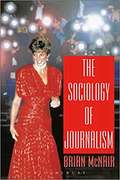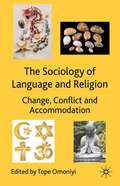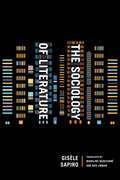- Table View
- List View
The Social and Political Thought of George Orwell: A Reassessment (Routledge Studies in Social and Political Thought #Vol. 45)
by Stephen IngleStephen Ingle is Professor at the Politics Department, University of Stirling. His main academic interests are in the relationship between politics and literature and in adversarial (two party) politics, especially in the UK.
The Social, Aesthetic, and Medical Implications of Performing Shame: Interdisciplinary Approaches (Routledge Studies in Health Humanities)
by Marlene GoldmanPerforming Shame shows how simulations of shame by North American writers and artists have the power to resist its withering influence. Chapter 1 analyses the projects’ key terms: shame, performance, and empathy. Chapter 2 probes the book’s key terms in light of a real-world study of an "empathy device" that aims to teach the public what it feels like to be disabled. Chapter 3 analyses how theatre intervenes in the practice of medicine via standardized patient actors who engage in role play to enhance medical students’ empathy for patients coping with shame. Chapter 4 moves from the clinic to the street to examine how The Raging Grannies’ public performances contest ageist constructions of older women’s bodies and desires. Chapter 5 shifts further from the bedside to the book by exploring Alison Bechdel’s graphic novel Fun Home, which challenges the shame projected onto homosexuals. Bringing the study full circle, the final chapter offers close readings of the stories of Alice Munro; like empathy devices, her texts restage scenes of shame to undo its malevolent spell. This book will be of interest to scholars in theatre and performance studies, health humanities, gender studies, queer studies, literary studies, disability studies, and affect studies.
The Socialist Patriot: George Orwell and War
by Peter StanskyAn incisive demonstration of how Orwell's body of work was defined by the four major conflicts that punctuated his life: World War I, the Spanish Civil War, World War II, and the Cold War. Few English writers wielded a pen so sharply as George Orwell, the quintessential political writer of the twentieth century. His literary output at once responded to and sought to influence the tumultuous times in which he lived—decades during which Europe and eventually the entire world would be torn apart by war, while ideologies like fascism, socialism, and communism changed the stakes of global politics. In this study, Stanford historian and lifelong Orwell scholar Peter Stansky incisively demonstrates how Orwell's body of work was defined by the four major conflicts that punctuated his life: World War I, the Spanish Civil War, World War II, and the Cold War. Young Orwell came of age against the backdrop of the First World War, and published his final book, Nineteen Eighty-Four, nearly half a century later, at the outset of the Cold War. The intervening three decades of Orwell's life were marked by radical shifts in his personal politics: briefly a staunch pacifist, he was finally a fully committed socialist following his involvement in the Spanish Civil War. But just before the outbreak of World War II, he had adopted a strong anti-pacifist position, stating that to be a pacifist was equivalent to being pro-Fascist. By carefully combing through Orwell's published works, notably "My Country Right or Left," The Lion and the Unicorn, Animal Farm, and his most dystopian and prescient novel Nineteen Eighty-Four, Stansky teases apart Orwell's often paradoxical views on patriotism and socialism. The Socialist Patriot is ultimately an attempt to reconcile the apparent contradictions between Orwell's commitment to socialist ideals and his sharp critique of totalitarianism by demonstrating the centrality of his wartime experiences, giving twenty-first century readers greater insight into the inner world of one of the most influential writers of the modern age.
The Socio-Cognitive Approach to Communication and Pragmatics (Perspectives in Pragmatics, Philosophy & Psychology #33)
by Istvan KecskesThe book aims to serve as a theoretical framework for the socio-cognitive approach (SCA) that is an alternative to the two main lines of pragmatics research: linguistic-philosophical pragmatics and sociocultural-interactional pragmatics. SCA broadens the scope of the field with an intent to incorporate not only L1 communication but also intercultural communication, and communication in a second language. The author integrates the pragmatic view of cooperation and the cognitive view of egocentrism and emphasizes that both cooperation and egocentrism are manifested in all phases of communication, albeit to varying extents. SCA places equal importance on the social and cognitive individual factors in pragmatics. The author claims that while (social) cooperation is an intention-directed practice that is governed by relevance, (individual) egocentrism is an attention-oriented trait dominated by salience.The book serves as a theoretical guide for researchers and students who would like to understand how we need to change first language-based theories to make sense of what happens not only in L1 but also in intercultural and multi-lingual interactions.
The Socio-Literary Imaginary in 19th and 20th Century Britain: Victorian and Edwardian Inflections (Among the Victorians and Modernists)
by Maria K. Bachman Albert D. PionkeAt once an invitation and a provocation, The Socio-Literary Imaginary represents the first collection of essays to illuminate the historically and intellectually complex relationship between literary studies and sociology in nineteenth and early twentieth-century Britain. During the ongoing emergence of what Thomas Carlyle, in "Signs of the Times" (1829), pejoratively labeled a new "Mechanical Age," Britain’s robust tradition of social thought was transformed by professionalization, institutionalization, and the birth of modern disciplinary fields. Writers and thinkers most committed to an approach grounded in empirical data and inductive reasoning, such as Harriet Martineau and John Stuart Mill, positioned themselves in relation to French positivist Auguste Comte’s recent neologism "la sociologie." Some Victorian and Edwardian novelists, George Eliot and John Galsworthy among them, became enthusiastic adopters of early sociological theory; others, including Charles Dickens and Ford Madox Ford, more idiosyncratically both complemented and competed with the "systems of society" proposed by their social scientific contemporaries. Chronologically bound within the period from the 1830s through the 1920s, this volume expansively reconstructs their expansive if never collective efforts. Individual essays focus on Comte, Dickens, Eliot, Ford, and Galsworthy, as well as Friedrich Engels, Elizabeth Gaskell, G. H. Lewes, Virginia Woolf, and others. The volume's introduction locates these author-specific contributions in the context of both the international intellectual history of sociology in Britain through the First World War and the interanimating intersections of sociological and literary theory from the work of Hippolyte Taine in the 1860s through the successive linguistic and digital turns of the late twentieth and early twenty-first centuries.
The Sociocultural Activity of High Stakes Standardised Language Testing: Toeic Washback In A South Korean Context (English Language Education #12)
by Dawn Karen BoothThis book explores the influence of high stakes standardised testing within the context of South Korea. South Korea is regarded as a shining example of success in educational achievement and, as this book reveals, pressurised standardised testing has been a major contributing factor to its success. This unique country provides an excellent setting from which to explore the powerful relationship that exists between testing and learning and can advance our understanding of which factors and test conditions will positively and negatively influence learning. This book follows the test activity of a group of Korean university students preparing for the TOEIC (Test of English for International Communication) and posits a revised model of the influence of testing on learning. It calls for a more socially situated view of tests and test-takers considered in relation to the sociocultural, historical, political and economic contexts in which they are embedded.
The Sociocultural Functions of Edwardian Book Inscriptions: Taking a Multimodal Ethnohistorical Approach (Routledge Research in Literacy)
by Lauren Alex O'HaganThis innovative text draws on theories and methodologies from the fields of multimodality, ethnography, and literacy studies to explore the sociocultural significance of book ownership and book inscriptions in Edwardian Britain. The Sociocultural Functions of Edwardian Book Inscriptions examines evidence gathered from historical records, archival documents, and the inscriptive practices of individuals from the Edwardian era to foreground the social, communicative, and performative functions of inscriptive practices and illustrate how material, lexical, and semiotic means were used to perform identity, contest social status, and forge relationships with others. The text adopts a unique ethnohistorical approach to multimodality, supporting the development of a typography of book inscriptions which will serve as a unique interpretive framework for analysis of literary artefacts in the context of broader sociopolitical forces. This text will benefit doctoral students, researchers, and academics in the fields of Literacy Studies, English language arts, and research methods in education more broadly. Those interested in British book history, anthropology, and 20th-century literature will also enjoy this volume.
The Sociolinguistic Competence of Immersion Students
by Terry Nadasdi Raymond MougeonThis book reports the findings of an extensive research project on the acquisition of the native norms of spoken French variation by French immersion students who have learnt their second language primarily in an educational context. The project focused on a range of phonetic, lexical and grammatical sociolinguistic variants documented in studies of contemporary first language varieties of spoken French, and assessed the extent to which the students master the linguistic and extra-linguistic factors which govern variant choice. The book also discusses pedagogical strategies to improve the students' mastery of spoken French variation. The book represents an important contribution to an under-researched aspect of advanced Second Language Acquisition in an institutional setting.
The Sociolinguistics of Academic Publishing: Language and the Practices of Homo Academicus
by Linus SalöThis book presents a sociolinguistics of academic publishing from an historical and contemporary perspective. Using Swedish academia as a case study, it focuses on publishing practices within history and psychology. The author demonstrates how new regimes of research evaluation and performance-based funding are impinging on university life. His central argument, following the French sociologist Bourdieu, is that the trend towards publishing in English should be understood as a social strategy, developed in response to such transformations. Thought-provoking and challenging, this book will interest students and scholars of sociolinguistics, language planning and language policy, research policy, sociology of science, history and psychology.
The Sociolinguistics of Digital Englishes
by Patricia Friedrich Eduardo H. Diniz de FigueiredoThe Sociolinguistics of Digital Englishes introduces core areas of sociolinguistics and explores how each one has been transformed by the current era of digital communication and the Internet. Addressing the changing dynamics of English(es) in the digital age, this ground-breaking book: discusses the spread of English and its current status as a global language; demonstrates how key concepts such as language change, speech communities, gender construction and code-switching are affected by digital communications; analyzes examples of the interaction of Englishes and social media such as Facebook, Twitter and Urban Dictionary; and provides questions for discussion and further reading with each chapter. Accessible and innovative, this book will be key reading for all students studying sociolinguistics and digital communication or with an interest in language in the globalized multimedia world.
The Sociolinguistics of Ethiopian Sign Language: A Study of Language Use and Attitudes
by Eyasu Hailu TameneEthiopian Sign Language (EthSL) emerged relatively recently; its development is closely tied to the establishment of the first school for deaf students in Addis Ababa by American missionaries in 1963. Today, EthSL is used by more than a million members of the Ethiopian Deaf community, but it remains an under-researched language. In this work, Eyasu Hailu Tamene presents a groundbreaking study of EthSL that touches on multiple aspects of Deaf people’s lives in Ethiopia. Tamene collects data from three principal groups of people: deaf participants, teachers of deaf students, and parents of deaf children. He examines EthSL use within families, in formal and informal settings, and in various community spaces. He documents the awareness among different groups of the services available for deaf people, such as sign language interpreters and Deaf associations. He finds that members of the Deaf community show positive attitudes toward the use of EthSL and investigates the factors that impact those attitudes. His work indicates that there are still critical gaps in recognition and support for the use of EthSL, which can pose a threat to the vitality of the language. The Sociolinguistics of Ethiopian Sign Language will help to advance public understanding of EthSL and contribute to improved educational and social outcomes for the Deaf community in Ethiopia.
The Sociolinguistics of Global Asias (Routledge Studies in Sociolinguistics)
by Jerry Won LeeThe volume explores the social, cultural, and historical forms of “language” that have come to be associated with “Asia” as a global phenomenon and their implications for better understanding the contemporary linguistic and political landscape in Asias. The book examines the flows of migration, people, cultures, and language resources within, across, through, to, and from Asias in tandem with social, political, and ideological factors, drawing on case studies of global iterations of a wide range of Asian national and cultural imaginaries. In so doing, the volume builds on the growing body of scholarship on the sociolinguistics of globalization in its critical inquiries into the linguistic and cultural practices that have come to be constitutive of national or supranational localities toward unpacking the forces of globalization more broadly. This book will be of particular interest to students and scholars interested in sociolinguistics, multilingualism, linguistic anthropology, Asian Studies, and Asian American studies.
The Sociolinguistics of Globalization
by Jan BlommaertHuman language has changed in the age of globalization: no longer tied to stable and resident communities, it moves across the globe, and it changes in the process. The world has become a complex 'web' of villages, towns, neighbourhoods and settlements connected by material and symbolic ties in often unpredictable ways. This phenomenon requires us to revise our understanding of linguistic communication. In The Sociolinguistics of Globalization Jan Blommaert constructs a theory of changing language in a changing society, reconsidering locality, repertoires, competence, history and sociolinguistic inequality.
The Sociolinguistics of Higher Education: Language Policy and Internationalisation in Catalonia
by Josep Soler Lídia Gallego-BalsàThis book investigates the sociolinguistic dimension of the internationalisation of higher education, examining the linguistic tensions and ambiguities experienced by universities around the world, particularly in non-anglophone contexts. Joining current debates within discursive and ethnographic approaches to language policy, the authors analyse the narrative emerging from university language policy documents, and then trace the stance-taking processes of different stakeholders at a small university in Catalonia. They pay particular attention to how teachers, administrative staff, and exchange students position themselves in connection to the role of Catalan and its coexistence with other languages at the university. This book will be of interest to language policy scholars and practitioners, as well as graduate students in sociolinguistics and applied linguistics
The Sociolinguistics of Hip-hop as Critical Conscience: Dissatisfaction and Dissent
by Damian J. Rivers Andrew S. RossThis book adopts a sociolinguistic perspective to trace the origins and enduring significance of hip-hop as a global tool of resistance to oppression. The contributors, who represent a range of international perspectives, analyse how hip-hop is employed to express dissatisfaction and dissent relating to such issues as immigration, racism, stereotypes and post-colonialism. Utilising a range of methodological approaches, they shed light on diverse hip-hop cultures and practices around the world, highlighting issues of relevance in the different countries from which their research originates. Together, the authors expand on current global understandings of hip-hop, language and culture, and underline its immense power as a form of popular culture through which the disenfranchised and oppressed can gain and maintain a voice. This thought-provoking edited collection is a must-read for scholars and students of linguistics, race studies and political activism, and for anyone with an interest in hip-hop.
The Sociolinguistics of Iran’s Languages at Home and Abroad: The Case of Persian, Azerbaijani, and Kurdish
by Seyed Hadi MirvahediThis book examines the sociolinguistics of some of Iran’s languages at home and in the diaspora. The first part of the book examines the politics of minority languages and the presence of hegemonic discourses which favour Persian (Farsi) in Iran, exploring issues such as language maintenance and shift, linguistic ideologies and practices among Azerbaijani and Kurdish-speaking communities. The authors then go on to examine Iranians’ linguistic ideologies, practices and (trans)national identity construction in the diaspora, investigating both the challenges of maintaining a home language and the strategies and linguistic repertoires employed when constructing a diasporic identity away from home. This book will be of interest to students and scholars of minority languages and communities, diaspora and migration studies, and language policy and planning.
The Sociolinguistics of Sign Languages
by Ceil LucasThis is an accessible introduction to the major areas of sociolinguistics as they relate to sign languages and deaf communities. Clearly organized, it brings together a team of leading experts in sign linguistics to survey the field, and covers a wide range of topics including variation, multilingualism, bilingualism, language attitudes, discourse analysis, language policy and planning. Each chapter introduces the key issues in each area of inquiry and provides a comprehensive review of the literature. The book also includes suggestions for further reading and helpful exercises.
The Sociolinguistics of South African Television: Language Ideologies in Selected Case Studies
by Kealeboga AisengThis book explores the interwoven relationship between language, media, and society in post-Apartheid South Africa. The author examines selected case studies from the sociolinguistic landscape of South African television, analysing dominant language ideologies and illuminating the challenges, opportunities, and potential for transformation. He argues for the power of television in shaping language ideologies, fostering cultural understanding, and advocating for more inclusive and equitable language usage in the media. This book contributes to the field of sociolinguistics by emphasizing the complexity of multilingualism in South Africa and inviting ongoing exploration and dialogue in this landscape. It will be of interest to students and scholars of Sociolinguistics, Media Studies, African Culture and History, and Language Policy and Planning.
The Sociolinguistics of Survey Translation
by Yuling Pan Mandy Sha Hyunjoo ParkThe Sociolinguistics of Survey Translation presents an overview of challenges in survey translation, introduces a sociolinguistic framework to overcome these challenges, and demonstrates step-by-step how this framework works to guide and evaluate survey translation. Topics covered in the book include the relationship between linguistic rules, cultural norms, and social practices and their impact on survey translation, the role of orthography and semiotic symbols in translation, translation of different types of survey materials, and various stages of translation review and evaluation. This accessible book not only demonstrates how sociolinguistics can be a useful framework to address thorny survey translation problems but also provides practical and useful tools to guide survey translators and survey practitioners as they conduct and evaluate survey translations. Presenting an easy to implement yet comprehensive survey translation methodology and providing practical tools for survey translators, practitioners and students, this book is the essential guide to this fast-growing area.
The Sociolinguistics of Voice in Globalising China (Routledge Studies in Sociolinguistics)
by Jie DongThis book deploys and develops the notion of voice in an investigation of China’s rapidly reshuffling society. The book is structured around two aspects of the voicing process in contemporary China: (1) stratification of voice, which addresses the stabilizing condition of voice; and (2) restratification of voice that draws attention to the dynamics of the system of which the order is reshuffling and not yet apparent. This structure allows us to unveil the hidden forces played out in the voice making process and to stratifying and re-stratifying process of contemporary Chinese society in which some people are making themselves heard whereas others are losing voice. Despite its importance and usefulness, voice has been under theorized in recent decades. The ambitions of this book therefore are to invest serious efforts in developing the notion and to position it in the center of the theoretical toolkits available to students and scholars within and outside sociolinguistics.
The Sociolinguistics of Written Identity: Constructing a Self
by John S. SchmitThis book examines the ways in which a writer’s presentation of self can achieve or impede access to power. Conversations about written voice and style have traditionally revolved around the aesthetics of stylistic choice. These choices, while they help establish a writer’s presence in a text, too often ignore the needs of written identity as it crosses genres, disciplines, and rhetorical purposes. In contrast to stylistic investigations of a writer’s "voice" and its various components—diction, detail, imagery, syntax, and tone, for example—this book focuses on language variation and the linguistic features of a writer’s presence in a text, as well as the establishment of a writer’s social, cultural, and personal identity in a given text. The author attempts to explain the methods by which writers present themselves to their audiences. This book will be of particular interest to students and teachers of rhetoric and composition studies, as well as writers more broadly.
The Sociology of Disaster: Fictional Explorations of Human Experiences
by Thomas E. DrabekIn a book as illuminating as it is captivating, Thomas E. Drabek presents an in-depth analysis of the emotional impacts of disaster events and the many ripple effects that follow. Through the technique of storytelling, a series of nine fictional stories where characters experience actual disasters of different types throughout the United States illustrate the vulnerabilities and resilience to enhance the readers understanding of disaster consequences. Designed for classroom use, each story is followed by an "Analysis" section wherein discussion and research paper topics are recommended. These highlight links to published research findings. A "References" section details citations for all works included. Brief commentary in a "Notes" section adds further connections to other disasters and relevant research studies. The Sociology of Disaster is an important innovation in disaster education and will become an invaluable resource within universities and colleges that offer degrees in emergency management at both the undergraduate and graduate levels.
The Sociology of Journalism
by Brian McNairJournalism is a privileged cultural form. It is the main source of our knowledge about the world and our place in it, and the point at which the individual and the social worlds meet. Referring to cases from both the US and UK, including the White House sex scandals and the death of Diana, this book examines the various factors involved in the making of contemporary journalism, including economic and political pressures, changes in the technology of news gathering and production, and the growing role of sources and "source strategies." The text analyzes how such factors come to exert influence on the form, content, and style of journalism, and reviews current approaches to the sociological impact of journalism on individuals, groups, and organizations.
The Sociology of Language and Religion
by Tope OmoniyiThis is an eclectic collection of essays which successfully demonstrate how the Sociology of Language and Religion as a disciplinary paradigm responds to change, conflict and accommodation. The multiple religious coverage in the essays (Judaism, Christianity, Islam) as well as more or less global panorama.
The Sociology of Literature
by Gisèle SapiroThe Sociology of Literature is a pithy primer on the history, affordances, and potential futures of this growing field of study, which finds its origins in the French Enlightenment, and its most salient expression as a sociological pursuit in the work of Pierre Bourdieu. Addressing the epistemological premises of the field at present, the book also refutes the common criticism that the sociology of literature does not take the text to be the central object of study. From this rebuttal, Gisèle Sapiro, the field's leading theorist, is able to demonstrate convincingly one of the greatest affordances of the discipline: its in-built methods for accounting for the roles and behaviors of agents and institutions (publishing houses, prize committees, etc.) in the circulation and reception of texts. While Sapiro emphasizes the rich interdisciplinary nature of the approach on display, articulating the way in which it draws on literary history, sociology, postcolonial studies, book history, gender studies, and media studies, among others, the book also stands as a defense of the sociology of literature as a discipline in its own right.
